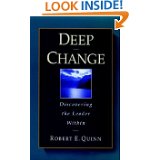Deep Change: Discovering the Leader Within by Robert S. Quinn
To large organizations, the basic premise in Deep Change could be radical and even threatening. In fact, Quinn himself uses the term “heretical” to describe his approach. As early as the first chapter, he makes it clear that deep change involves risk, potential for suffering, getting lost, re-inventing one’s self and breaking the rules. “Excellence never lies within the boxes drawn in the past”, the reader is advised. “To be excellent, the leaders have to step outside the safety net of the company’s regulations.” Towards the end of the book, Quinn states that true leaders “are willing to accept the necessary risk because it is the right thing to do. They care enough to risk dying for the organization, which would kill them for caring.” Death, here, is metaphorical. But it is certainly a bold metaphor for a business book.
Quinn is an academic, and his book does not spoon-feed the reader. There is no overarching, cute ‘hook’: an animal fable, fictitious company, or cozy relationship between curious/challenged business owner and affable/wise mentor. He is not afraid to talk theory or present his information as a diagram or chart. His writing is not witty. His anecdotes are matter-of-fact.
Something I found particularly valuable was his careful description of the differences between three organizational paradigms: the ‘technical’, or individual paradigm; the ‘transactional’, or managerial paradigm; and the ‘transformational’ or leadership paradigm. I also appreciated that Quinn spends a considerable amount of time describing the role of middle managers as transformational leaders, thus emphasizing that transformation is not the sole purview of the CEO but can be accomplished by anyone, regardless of their place in the pecking order.
Following each chapter, Quinn poses at least one full page of questions to the reader, divided into two categories: ‘personal steps to change’ and ‘organizational steps to change’. I found it difficult to respond meaningfully to many of the questions and, as a result, my ability to learn from the book was compromised. Why didn’t this format work for me? I’m not lazy. And I am keenly, personally interested in changing myself and the organizations I work for. I spoke with Ileana Vassiliou, a certified master coach and corporate trainer who works with Sage Portfolio Group, to learn more about why I was challenged by Quinn’s questions.
Vassiliou had not read Deep Change, so I gave her a quick sampling of some of the questions. “I’m guessing you’re a right-brain thinker,” she posited. “These types of questions sound very left-brained: logical, analytical, very structured, very ‘cookbook’. If the nature of the questions were right-brained, they’d open up vistas and entice the imagination.” Vassiliou was clear that she wasn’t judging Quinn’s approach. “There isn’t anything wrong with the questions,” she clarified. “If the reader is a left-brain thinker then they will love it.” Interestingly, she points out that true change may need to engage the right brain. “While we may prefer to use one side of the brain, we’ve all got both sides. The left brain tells you how to do things the way you’ve always done them. For meaningful change to occur, a coach needs to engage the magical-thinking, innovative right brain of a client.”
Understanding how we think and learn best goes beyond left-and-right-brain theories, however. Emergenetics is a personality profiling program, based on recent brain research and decades of data collected from almost 300,000 adults. Vassiliou is a certified Emergenetics Associate. “We usually get feedback on where we’re weak rather than where we glow, where our talents are,” Vassiliou admitted. “Emergenetics reveals our preferences and allows us to learn how to lead with our strengths, whether we’re analytical, conceptual, relational or structural thinkers.” The benefits go beyond self-knowledge, to an understanding of how our preferences impact others and can be modified for more effective communication.
Ultimately, I have come to appreciate Quinn’s book, not only for giving me insight into the qualities of leaders who change their workplaces, but for inspiring me to discover how I learn best.




